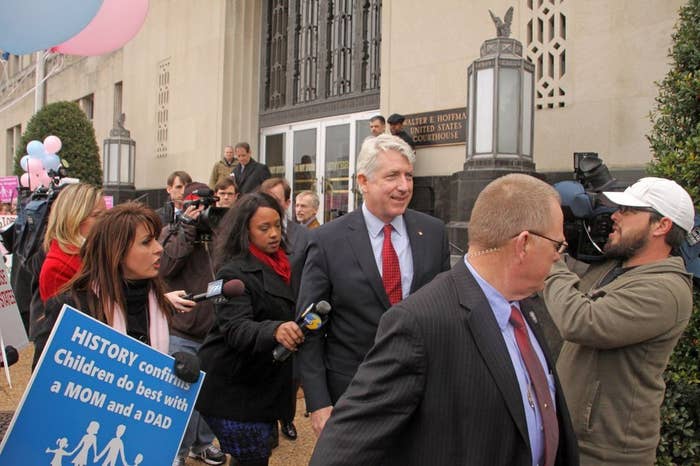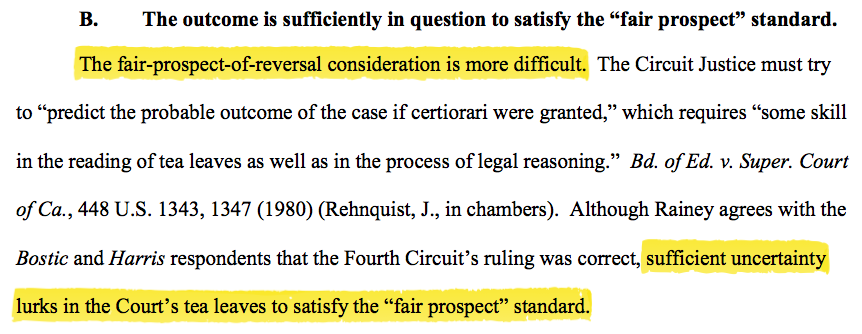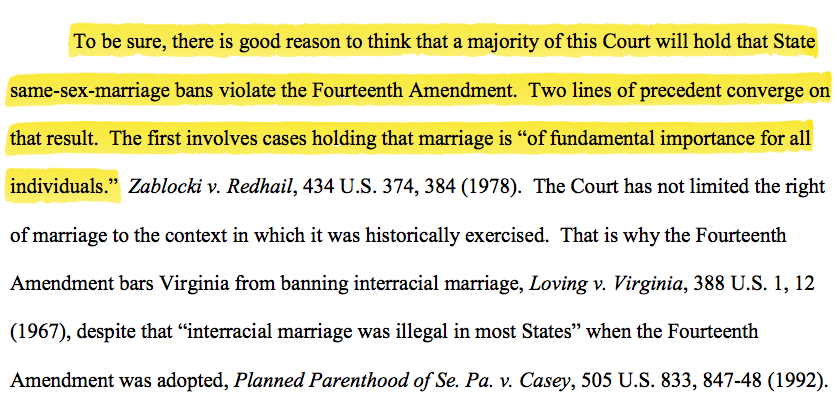
WASHINGTON — The likelihood is that the Supreme Court will, in the next 24 hours, stop same-sex couples in Virginia from being able to marry on Thursday.
At the same time, Virginia Attorney General Mark Herring is hoping to successfully complete his tightrope walk of opposing the constitutionality of the ban on same-sex couples' marriages while also seeking a ruling that would stop same-sex couples from being able to marry this week.
The move being sought from the Supreme Court — to issue a stay of a lower court's ruling striking down a state's ban on same-sex couples marrying during an appeal — is one the court has taken previously, with regards to Utah. Since then, it also stayed another lower court ruling ordering Utah to recognize the marriages of same-sex couples who wed during the time they could do so.
Nonetheless, as of Tuesday night, the Supreme Court had taken no action on a request to stay the recent 4th Circuit Court of Appeals ruling striking down Virginia's ban and keep the decision from going into effect. If the Supreme Court denies the request or takes no action, same-sex couples will be able to start marrying once the mandate issues from the 4th Circuit at 8 a.m. Thursday.
In the middle of all this, however, was the brief filed with Chief Justice John Roberts by Herring on Monday.
In the brief, Herring — who has argued that Virginia's ban is unconstitutional — writes that "the legal question here remains fraught with uncertainty," specifically that there is "sufficient uncertainty ... to satisfy" the Supreme Court's rule that there must be a "fair prospect" it will reverse the lower court's decision ruling that the ban is unconstitutional.
After the 4th Circuit agreed in July with a lower court that Virginia's ban is unconstitutional, Michèle McQuigg, the clerk of court for Prince George County, asked for the court to stop its ruling from going into effect while she asks the Supreme Court to review the case. The 4th Circuit, in a split ruling, denied her request on August 13, so she asked the Supreme Court — in a filing with Chief Justice John Roberts — to issue a stay itself.
Herring — a Democrat who took over the job from conservative Republican Ken Cuccinelli — agrees with the same-sex couples who brought the case that the ban is unconstitutional. His office argued the ban is unconstitutional at the 4th Circuit and plans to do so at the Supreme Court, if the court takes Virginia's case. The night before the 4th Circuit arguments in May, he talked about how after he reached the decision that the ban is unconstitutional earlier this year, "the more I looked at it, the more firmly convinced I became of that."
At the same time, however, he agrees with McQuigg that the ruling should be stayed while the Supreme Court decides if it is going to take the case. This is the same position taken by Herring at the 4th Circuit, so it is not surprising he took this position before the justices. What is unusual, though, is that he handled the arguments very differently at the Supreme Court.
When before the 4th Circuit, Herring — in a brief authored by his solicitor general, Stuart Raphael — wrote simply, "The debate over the traditional four-factor test [for granting a stay] engaged in by the parties is eclipsed by the fact that the Supreme Court has twice stayed injunctions blocking a State's same-sex-marriage ban under circumstances that cannot be materially distinguished from this case."
When before Roberts, however, the lawyers of the Virginia Attorney General's Office made a far different argument, looking into the specifics of the test for a stay at the Supreme Court and jumping through hoops to make the case for such a stay.
Although the stay question likely will be resolve before Thursday morning, the arguments made by Herring in this filing could come up again to the extent they conflict with — or, at the least, are in tension with — some of the very arguments that they will be making to the justices should the Supreme Court end up hearing their case.
Here are the factors:
"To warrant that relief, [the movant] must demonstrate (1) 'a reasonable probability' that this Court will grant certiorari, (2) 'a fair prospect' that the Court will then reverse the decision below, and (3) 'a likelihood that irreparable harm [will] result from the denial of a stay."
Here's what the Virginia Attorney General's Office wrote about those factors:

First, the lawyers sensibly argue that there's a good chance the Supreme Court will here the appeal of the Virginia marriage case:

Then, they argue there's "sufficient uncertainty" about whether the Supreme Court will uphold the constitutionality of the ban — a strange argument for lawyers who, if their case is taken, intend to argue that the ban is unconstitutional:

But wait! That set-up section is followed by this argument that there are several reasons to think the ban will be held to be unconstitutional if the justices hear the case:

More:

Even conservative Justice Antonin Scalia says so, they note:

But no! They turn again, back to saying "the legal question here" is "fraught with uncertainty":

Only then do they get to the prior stays granted by the Supreme Court — and after calling the issue a "controversial question":

As to the last factor, the lawyers say, more or less, there are harms on each side:

Although they do — with a very over-the-top analogy — note that refusing to issue a stay would not "spell disaster":

